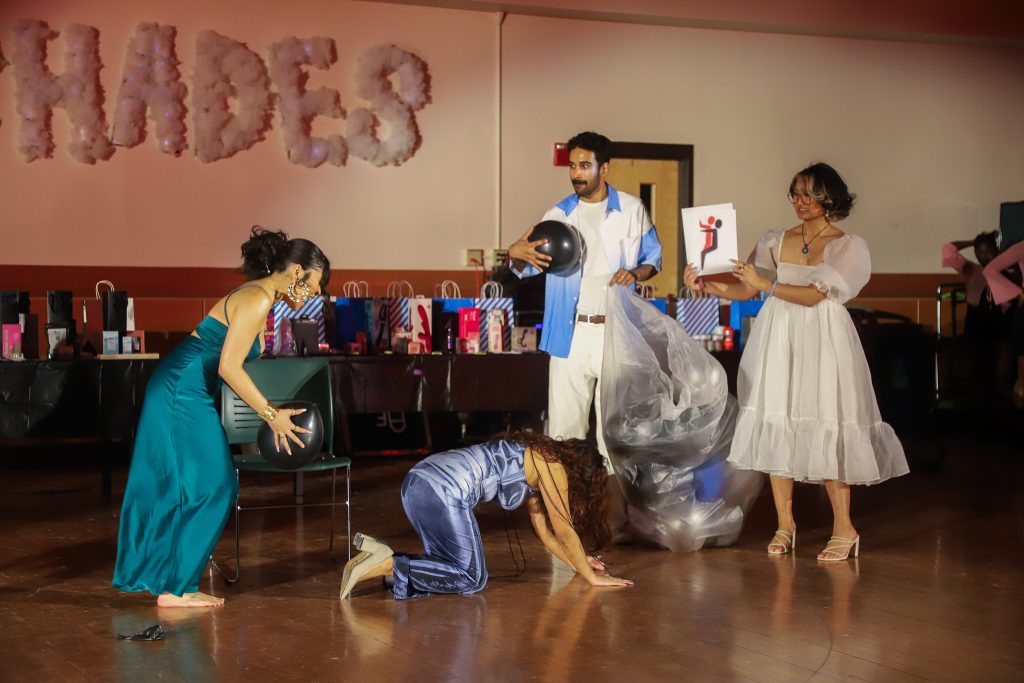SHADES, an organization for queer students of color, hosted its ninth-annual Sex Carnival this Saturday in the Mandela Room.
The event featured performances, and student organizations that set up tables with games while stamping attendees’ punch cards. These tickets could be spent on the carnival’s main attraction — raffles for a variety of sex toys for any sex or gender or one person or multiple people. Many of the prizes garnered embarrassed laughter from the audience, but Eshi Choi, SHADES’ president, explained why it was important that they auction off sex toys at the event.
“I think it’s really important that we destigmatize a lot of the shame that people have around their bodies and self-pleasure,” Choi, a senior majoring in philosophy, politics and law, said. “And when we are in a climate where people’s bodies are so controversial, and the idea that people can enjoy themselves is so controversial, it’s really important that we uphold the fact that we are here, we are gonna do what we want with our bodies regardless of what that means, and it really just means being able to accept yourself and allow yourself to have this level of pleasure.”
Each year, SHADES decides on a theme for the Sex Carnival. This year’s theme was “Celestial Waters” — a unique combination of the stars and the sea. Carnivalgoers showed up in blue and white, with beach- or galaxy-themed accessories. For past carnivals, Choi mentioned how the organization often used pink and red as the forefront colors for their event, and this year, they wanted to do something they hadn’t done before.
Many of the games set up by those tabling were intended to teach students about sex. The Neurodiversity Club, for instance, had Sex Pictionary, where one participant would draw a sex position, and the other would guess what it was called. They also had an assortment of cards that taught participants about issues having to do with sex in the neurodivergent community. Jubilation Yeh, the club’s president and a junior double-majoring in chemistry and environmental science, talked about the process of creating these cards.
“We started doing a lot of research about different ways sex and consent sexuality relate to neurodiversity,” Yeh said. “And so we got a whole bunch of different info about ways that neurodiversity actually can put a lot of people at greater risk of sexual assault in their lifetime, about infantilization of autistics and a whole bunch of different things that, unfortunately, are not always going to be fun facts, but should be known facts.”
The Sex Carnival is a relatively new event, but it has grown rapidly in popularity. Jada Charter ‘23 recounted what Sex Carnival looked like when they first attended it.
“It was the same kind of premise,” Charter said. “I think just a bit disorganized, because I think that was one of the first events where SHADES really blew up, and they weren’t expecting it to be as big as it was. It was also during Sexapalooza. So a lot of people probably walked in, some got tickets, thinking that it was part of the show. So it was kind of like a happy little accident.”
They were impressed by the extent of the expensive toys that SHADES was giving away and the large audience the event garnered. Charter also expressed their pride that, since she first joined SHADES, the organization has grown to include so many E-Board and intern positions.
Choi concluded that although sex education was one goal of the carnival, another important goal was to have fun.
“We try our best to make these prizes as accessible as possible, and a lot of people have a lot of fun,” Choi said. “You’ll see in our video recap that a lot of people are screaming up and down, jumping excited that they got to win a prize. So it’s really, really validating to see how much fun people have at our event. I guess that is ultimately our biggest priority, that people have fun and feel safe and welcomed in our environment and SHADES is always for everybody.”



